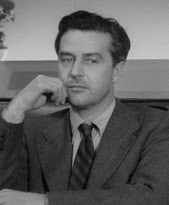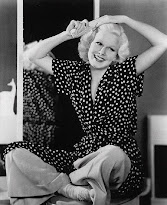Frankly I feel like it is my duty to talk a little bit about the country I grew up in since there are not so many German bloggers talking about classic films in English.. Besides that I think Germany isn't quite the country most bloggers who take part in this blogathon will talk about or would think of as a country to visit.. So I saw a little gap that I could fill.. Maybe.. I will for sure talk about some films set in other countries, too.. But let's start with the film most international classic film fans will think of when the words "German film" and "vacation" a mentioned:
MENSCHEN AM SONNTAG - EIN FILM OHNE SCHAUSPIELER
(= PEOPLE ON SUNDAY - A FILM WITHOUT ACTORS)
(Weimar Republic, 1930)
by Curt Siodmak, Robert Siodmak, Edgar G. Ulmer, Fred Zinnemann and Rochus Gliese - written also by Billy Wilder!! (Now that's quite a Hollywood-list, isn't it?)
Before I start to tell you what this film is about you have to know that this film is no usual film for it is really made without professional actors. It has "just" people acting as themselves - no actors acting in characters. It is a mixture of a narrative classic film telling you a story and a documentation. In fact it is one of the first independent films - if I may say so.. Very low budget was used - which was reportedly from the savings of the directors..
It is also one of the last German silent films - but don't be afraid: It has very little captions - so there is not too much to read - in case that would be your main problem with this film..
 |
| ~ Stars who were no stars.. ~ |
In a nut-shell:
Berlin, Germany: On a Saturday jack-of-all-trades Wolfgang (Wolfgang von Waltershausen) meets film-extra Christl (Christina "Christl" Ehlers) and after they drink a coffee together they decide to meet again on the next day - Sunday..
Meanwhile taxi driver Erwin (Erwin Splettstößer) has a little fight with his girlfriend - Annie (Annie Schreyer) who is working as a model - ending with them snatching off star postcards of their wall.. (including several Greta Garbo pictures of whom apparently esp. Erwin is fond and at least one picture of German film star Willy Fritsch - apparently Annie's crush.. - and yes - though they are not married they share the same flat - and bed..) The little dispute ends as Wolfgang appears and he and Erwin start to play cards instead..
 |
| ~ Wolfgang und Christl in a little café.. ~ |
Meanwhile taxi driver Erwin (Erwin Splettstößer) has a little fight with his girlfriend - Annie (Annie Schreyer) who is working as a model - ending with them snatching off star postcards of their wall.. (including several Greta Garbo pictures of whom apparently esp. Erwin is fond and at least one picture of German film star Willy Fritsch - apparently Annie's crush.. - and yes - though they are not married they share the same flat - and bed..) The little dispute ends as Wolfgang appears and he and Erwin start to play cards instead..
 |
| ~ shirty Erwin - also: Greta Garbo and Willy Fritsch.. ~ |
Sunday - the next day: Erwin, Wolfgang and Christl spent the day at Nikolassee - a lake in Berlin-Nikolassee - together with Christl's best friend Brigitte (Brigitte Borchert), a salesgirl in a record shop. They will go for a swim, eat, listen to music and go for a walk..
After Christl refuses Wolfgang's advances he turns to Brigitte - who is much more of an easier prey for him - they will spent some apparently very, very, VERY intimate time under a tree while Erwin is asleep and Christl is sulking..
After this little encounter all four of them spent some time in a pedalo on the lake - where Wolfgang and Erwin become interested into two other girls in another boat - much to the chagrin of Christl and Brigitte.
Finally they return to Berlin and Brigitte hopes for another Sunday with Wolfgang - who agrees towards her on that - but as we will learn rather will go with Erwin to a soccer game (I bet right now there are several German ladies living trough exactly that scenario since these days the European Championship is on..)
Annie has overslept the whole day..
A new week is starting the next morning.. It's Monday again in Berlin..
 |
| ~ a little picnic.. ~ |
After Christl refuses Wolfgang's advances he turns to Brigitte - who is much more of an easier prey for him - they will spent some apparently very, very, VERY intimate time under a tree while Erwin is asleep and Christl is sulking..
 |
| ~ Wolfgang and Brigitte getting to know each other.. ~ |
After this little encounter all four of them spent some time in a pedalo on the lake - where Wolfgang and Erwin become interested into two other girls in another boat - much to the chagrin of Christl and Brigitte.
 |
| ~ Christl and Brigitte - learning a lesson - and not amused about it.. ~ |
Finally they return to Berlin and Brigitte hopes for another Sunday with Wolfgang - who agrees towards her on that - but as we will learn rather will go with Erwin to a soccer game (I bet right now there are several German ladies living trough exactly that scenario since these days the European Championship is on..)
Annie has overslept the whole day..
 |
| ~ Sleepy Sunday for Annie.. ~ |
Kurt Gerron, Ernö Verebes, Heinrich Gretler and Valeska Gert.
 |
| ~ Kurt Gerron ~ |
To be honest: I only noticed Valeska Gert.. I am ashamed of myself.. Especially since Kurt Gerron is one of my favourites.. He will receive a post of his own on this blog for sure.. He was not only an actor - you might know him from THE BLUE ANGEL with Marlene Dietrich - but also a great director. He was killed in Auschwitz-Birkenau in 1944..
 |
| ~ Dancer Valeska Gert in her short appearance in PEOPLE ON SUNDAY ~ |
Schmooze:
- There is no full copy of this film saved since the original version was lost. So the remaining film is about 74 minutes long.
- PEOPLE ON SUNDAY was merely filmed on Sundays in summer of 1929 due to the fact that all leading "actors" were working in their business for the rest of the week.
- The film was made after a report Curt Siodmak wrote. At this time his name was written "Kurt".. Billy Wilder wrote the script after this report.
- It was the first time that Curt and Robert Siodmak, Edgar G. Ulmer and Fred Zinnemann worked as directors. How amazing is it to have those plus Billy Wilder together in one film??
- For Rochus Gliese it was his second to last work as a director.
- Cinematographer Eugan Schüfftan also worked on EYES WITHOUT A FACE (1960) (<- you can read my review on this film here..)
There is a new score by Elena Kats-Chernin with Czech Film Orchestra - I like that score - though some parts I find rather irritating - especially when they contain singing voices.. There is also an alternate soundtrack by Steven Garling which is a soundtrack completely made of percussion sounds. I find also that one a bit challenging.. Steven Garling himself was an expert when it came to Silent movies. He did not only work with those but also intoned Bible passages since he was a believing Christ. He died in 2008 at the age of 39 years due to cancer.
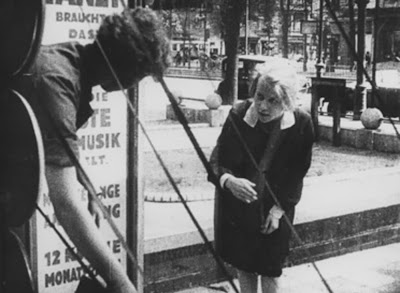 |
| ~ Brigitte at work - re-arranging the shop windows. ~ |
What ever happened to...
... Erwin Splettstößer?
He appeared in two other films directed by Robert Siodmak: ABSCHIED (FAREWELL) (1930) and VORUNTERSUCHUNG (INQUEST) (1931).
-----
... Brigitte Borchert (November 15, 1910 - August 7, 2011)?
PEOPLE ON SUNDAY was the only part she would play for a film - she did appear though in a documentation about this film in 2000. She married illustrator Wilhelm M. Busch in 1936.
 |
| ~ Pen drawing by Wilhelm M. Busch ~ |
Last year when she died with almost 101 years of age several newspapers here wrote about her and commemmorated PEOPLE ON SUNDAY.
-----
...Wolfgang von Waltershausen (1900-1973)?
He appeared also in two other films: EIN BURSCHENLIED AUS HEIDELBERG (1930) by Karl Hartl and in DER MANN, DER SEINEN MÖRDER SUCHT (LOOKING FOR HIS MURDERER) (1931) by Robert Siodmak. Both films were also written by Billy Wilder.. Sidenote: LOOKING FOR HIS MURDERER is due for a review here on this blog, too..
-----
... Christina "Christl" Ehlers (March 10, 1911 - February 2, 1960)?
She left Germany in 1933 with her father Alfred Ehlers (a well-known artist and architect) who tried to help as many Jewish people (including his family) as possible to escape from Nazi Germany. First they went to Spain but when Civil war broke out there Christl Ehlers, her father and her four year old son left for Great Britain. Later Christl would follow her mother - famous harpsichordist Alice Ehlers who already lived in Los Angeles. Alice Ehlers was a friend of Albert Schweitzer and they used to write several letters.. She also appears in WUTHERING HEIGHTS (1939)... Christl Ehlers appeared besides PEOPLE ON SUNDAY only in ESCAPE (1940) by Mervyn LeRoy in a small part as a student. In 1947 she married Hampden Wentworth and they would have four other children. In 1960 they both died due to a plane crash in New Mexico leaving behind their children - and Christl's by that time of course grown-up son..
Cinematic World Tour Blogathon:
I chose this film because I think people everywhere on this world can relate to it. Most of us will go on a little trip when we have a day off - and it doesn't have to be a travel around the world.. And for we never traveld too much when I was a child I can relate to this little Sunday trip to a near by lake very much..
 |
| ~ Christl and Brigitte ~ |
On Germany and German customs:
As far as I can tell: In this country soccer isn't just a sport - it's a religion. You don't make fun of it. (Trust me - I tried.. Grave mistake..) Frankly, I am not very interested in this sport - but I will get every info of it - since every information magazine in telly will talk about it - and my neighbour is shouting at "his boys" (no matter if it's "just" his home team or the national team like yesterday..) while they're in a game - apparently they won yesterday since my neighbour after that excersised his conjugal rights quite noisy.. - in case they would have lost there would just have been a certain tapping sound against my walls.. (Gosh.. I am soo wishing for thicker walls around here..)
 |
| ~ ... ~ |
Another quite strange German custom you can see in this film celebrated by a group of young men (around 36:16 in the clip below): They spank each other. It is an old custom and I think not that much celebrated these days - aside from special occasions.. There are several rules and different ways to "play" it - but I think this certain game they play here is: some guy is spanking another - and the one who got spanked has to guess who spanked him.. yes.. yes.. the days before World of Warcraft..
Again - there are not so many captions - and those which are there are translated into English.. Besides with 74 minutes it's not a very long film.. (just saying..)
Brigitte Borchert once stated that though the critics were enthusiastic about this film most "ordinary" people she spoke to were not.. They went to cinema to see a more glamourous life - not their everyday life. To see how four (resp. five) young people spent their Sunday they would not have to go to the pictures for.. They were for sure right about that - still the film was a hit.
For me (and as I think also for many other admirers of this film) especially the scenes showing daily Berlin life in that era are the basic for this film's charme. Berlin is one of my favourite cities - and I would love to live there once.. There are few (maybe none) places in this world I feel that much at home like I do in Berlin..
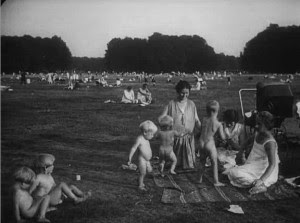 |
| ~ this looks so much like the summers we spent as children on the countryside here.. ~ |
Besides that as I stated before it also has much relation to how I spent my summers as a child and teenager.. Just by the way there are a lot of children in this film - and sometimes one wonders what became of them.. I love all those scenes showing ordinary people and their everyday life. Yes, I love the realism of PEOPLE ON SUNDAY. It is the complete alternative draft to Hollywood's star cult - hands down: of course there was also a star cult in German cinema - and here we had (and still have) stars, too.. But it wasn't that industrialised.. (not that they didn't try..)
About the "triangle":
 |
| ~ While Christl is sleeping on his one hand.. ~ |
 |
| ~ ... Wolfgang's other hand is handling.. uhm.. someone else.. ~ |
I think it's quite interesting to see Wolfgang hunting for skirts.. - or.. well.. what's under them.. I don't think he is a character I like.. But he really appears realistic to me - so do the others. None of them seems to act in a set up way - though of course there was a script. This film also has a humour I enjoy - the scene in which Brigitte and Wolfgang will get some.. uhm.. "action" ... - the camera turns slowly away along some trees - and will end at the sight of a rubbish heap to turn back to the couple - who by now re-arrange their clothes.. (Notice that Wolfgang's shirt is tattered now and Brigitte has to fix her gaters..)
Besides: some of the scenes in this film have a certain poetry in it..
Though this film shows apparently bygone times - it shows you very much where I come from - since for me when you change the dresses and add a better dental care it shows you how Summer did look and still looks to me..
Thank you for listening
Bon Voyage - and...
...Remember: Safety first!
...Remember: Safety first!
Irene























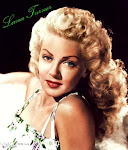


























_03.jpg)


























































































